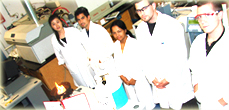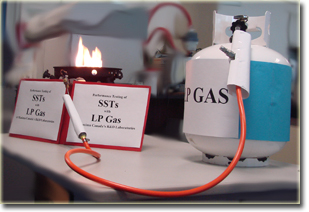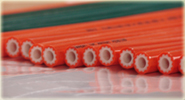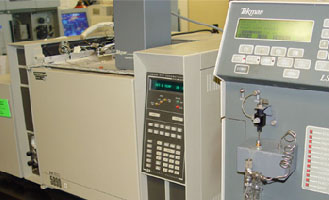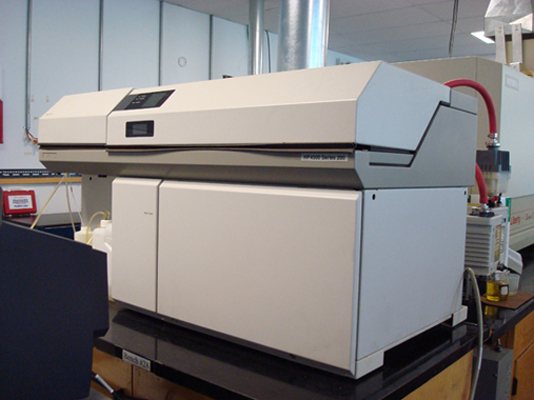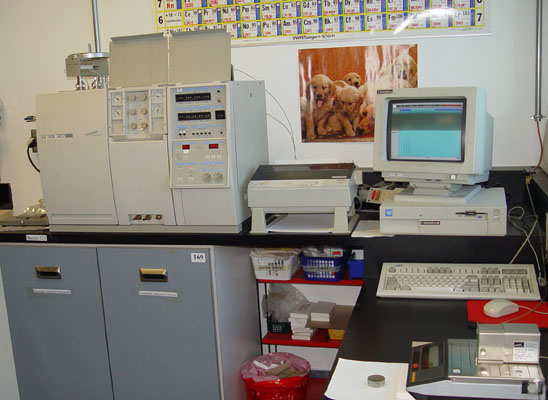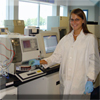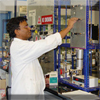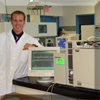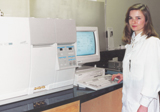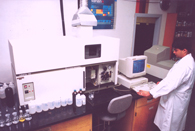| Facilities for Rush Services |
State-of-the-art facilities
and expert chemists give our laboratories the capability of handling virtually
all environmental analytical requirements. Equipment and personnel resources
allow us to provide our clients with the option of Rush Service (Same
Day, 24 Hours & 48 Hours) for time critical projects, for a certain
number of samples.
|
Physical & Inorganic Analysis |
Parameters analyzed include:
Acidity, TKN, Phosphates, Sulphate, Sulphide, Halogens (Cl, Br, I, F),
COD, Chromium, Phenols, Silica, Solids, Sodium, Cyanide, Nitrite, Nitrate,
Absorption Ratio, etc.
| |
|
Priority Pollutants by GC/MS
|
Other GC/MS Services
|
- Volatile organic compounds
- Base/Neutral Extractables
- Acid Extractables
- Polynuclear Aromatic Hydrocarbons (PAHs)
- Organochlorinated Pesticides & PCBs
- Chlorinated Aromatic (GC/ECD)
- Gasoline, Diesel and other Fuel Identification
|
- BTEX
- Halogenated Organics
- Identification and Characterization
- Total Purgeable Hydrocarbons (TPH)
- Total Extractable Hydrocarbons
|
Digestion, Preconcentration and
Extraction techniques, depending upon the nature of the metal, are routinely
performed. AA, ICAP, Hydride Generation and Cold Vapour techniques are
appropriately used.
All of the elements of the periodic table, accessible to analyses by the combined capabilities of Atomic Absorption Spectroscopy (ICP-AES) techniques are analyzed. Digestion, Bomb digestion, Preconcentration, and Extraction techniques are routinely performed as required in the sample preparations. Typical elemental analysis includes: Aluminum, Barium, Bismuth, Cesium, Chromium, Iron, Lead, Molybdenum, Niobium, Palladium, Sodium, Tantalum, Tungsten, Vanadium, Zirconium, and many, many more.
Guelph
Chemical Laboratories routinely performs analysis of drinking water, groundwater
and surface water samples for a variety of parameters and test groups.
We offer our clients the choice of several packages designed to suit their
individual requirements. Services offered include:
- Inorganics (Metals
and Ions)
- VOC (Volatile Organic
Compounds)
- PCB Analysis
- PAH Analysis
- Pesticides and Herbicides
- Total Petroleum Hydrocarbons
- Microbiological Testing
(E.coli, Total Coliforms, Heterotrophic Plate Count) by arrangement
with collaborative laboratories
- Various other parameters
Effluent discharge from industry into the local sanitary or storm sewer system requires monitoring to ensure compliance with municipal bylaws. GCL can assist industries in the following ways:
- Analysis of wastewater samples for complete sewer bylaw scan, or individual parameters
- Sampling technicians available to come to your facility and collect samples
- Our reports are presented in a format easy for clients to compare results of their sample to the allowable limits for their municipality
- We provide sample containers with appropriate preservatives to clients who collect their own samples
- Composite Sampling services (24 hours and
7 days)
Samples from contaminated sites, remediation projects, and properties involved in real-estate transactions are frequently analyzed by our laboratories. Additionally, we offer analysis of soils for determination of nutrients and fertility. Analysis is carried out as per Ministry of Environment (MOE), Guidelines for Use at Contaminated sites in Ontario (GUCSO) and Canadian Council of Ministers of the Environment (CCME) guidelines. Some of the analyses include:
- Analysis of Volatile Organic Compounds
- Analysis of Petroleum Hydrocarbons (Gas/Diesel)
- Analysis of Petroleum Hydrocarbons (Heavy Oils)
- Metals
- Carbon, Hydrogen and Nitrogen Determination
- Total Organic Carbon Determination
- Particle Size
- PCB Analysis
- PAH Analysis
- Analysis of samples as per MOE Compost Guidelines
|
Industrial Waste Characterization |
Ontario Regulation 558 (replacing Regulation 347) has been implemented by the Ministry of Environment and requires that all generators of liquid industrial and hazardous waste test their waste streams against the new criteria. Guelph Chemical Laboratories can assist waste generators and waste disposal companies as follows:
- Conduct waste audit in plants
- Review plant processes and MSDS to determine which parameters need to be analyzed for a particular waste stream
- Our technicians are available to come to your facility to collect "representative" samples for testing
- Analysis of parameters listed on Regulation 558 is carried out in our lab using the USEPA-SW846 TCLP (Toxicity Characteristic Leaching Procedure)
|

